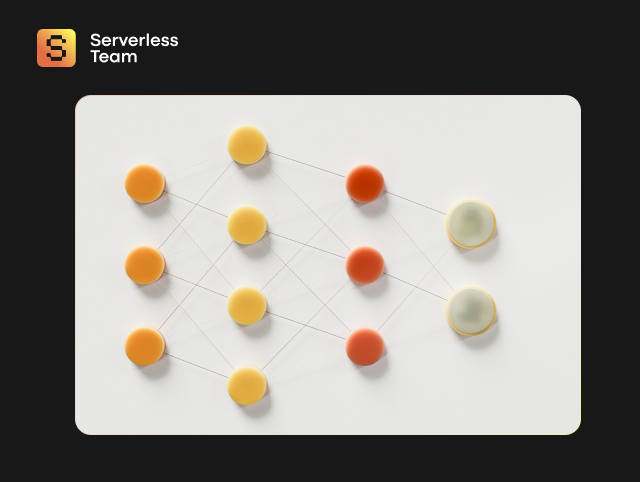Here, we covered the diverse landscape of AWS Lambda, delving into its nuanced architecture, real-world use cases, benefits, and limitations. From aiding startups to fueling enterprise innovations, discover AWS Lambda use cases and discover how it's reshaping how we think about serverless computing.
If you are into cloud computing, you've likely come across one name again and again: AWS Lambda.
But with its versatile nature, the lingering question is: how and when to wield its power most effectively? Rest assured, you're not alone in this quest. Many tech enthusiasts and enterprises google this very question, sifting through endless pages looking for "Lambda use cases."
At Team Serverless, we've danced this dance, faced those challenges, and unearthed the treasures of AWS Lambda's potential. With our extensive experience, we've mapped out the terrain, understanding the myriad of Lambda uses and pinpointing the most impactful use cases for AWS Lambda.
In this piece, we'll walk you through some of these revelations, shedding light on when and how AWS Lambda can truly shine.

We take care of serverless development so you can focus on your business
Don't want to wait for our site launch? Let's talk about your idea right now.


Understanding AWS Lambda: Beyond the Basics
AWS Lambda is a revolutionary force that redefines the very essence of how we build and deploy applications. But to truly wield its power, it's vital to grasp its underpinnings.
At its core, AWS Lambda is a serverless computing platform. This means you don't grapple with the typical server management woes. Instead, you focus on crafting your code, and AWS Lambda runs it in high-availability compute infrastructure.
For every incoming event, Lambda executes the function asynchronously, scales it as needed, and you're only billed for the actual compute time.
AWS Lambda's Architecture Nuances
Peeling back the layers on AWS Lambda reveals some intricate architectural details. Let’s dive deep into the nuances:
- Serverless Model: The most significant nuance is that AWS Lambda is serverless. This means you don't manage the server infrastructure; AWS does. You only worry about the code and its dependencies, and AWS takes care of provisioning, scaling, patching, and administration.
- Event-driven Execution: Lambda functions are event-driven. This means they execute in response to events, such as changes to data in an S3 bucket, updates in a DynamoDB table, or custom events you define. This offers a highly reactive system.
- Stateless Design: Every AWS Lambda function is stateless, meaning it doesn't retain a state between function executions. If you need to maintain this state, you should use external storage like DynamoDB or S3.
- Built-in Fault Tolerance: Lambda provides built-in fault tolerance. It maintains computing capacity and infrastructure reliability, including monitoring, logging via Amazon CloudWatch, and automatic retries.
- Concurrency and Scaling: AWS Lambda automatically scales your application by running code in response to each event. Your trigger can be an uploaded image, a new log file, a new row in a database, etc. This automatic scaling is based on the number of events happening.
- Short-lived Execution: Functions can run for up to 15 minutes per invocation. This requires developers to consider breaking up longer tasks into smaller, more manageable pieces.
- Execution Role: AWS Lambda needs permissions to interact with other AWS services. This is achieved using IAM roles. Lambda assumes this execution role when the function is invoked.
- Integrated Security Model: Lambda integrates with AWS Identity and Access Management (IAM), VPC, AWS Key Management Service (KMS), and AWS CloudTrail to provide robust security features.
- Environment Variables: You can set environment variables for your Lambda function, which can be used to store secrets, configurations, etc., without hardcoding them.
- Cold and Warm Starts: The first time a Lambda function is invoked, it experiences what's called a "cold start." This means the environment is set up from scratch. Subsequent invocations use the same environment if invoked shortly after a previous one, termed as "warm starts," which are faster.
- VPC Support: If your Lambda function needs to access resources inside a VPC, you can do so, but be aware that this might add an additional latency due to the ENI (Elastic Network Interface) provisioning.
- Custom Runtimes with Layers: While AWS offers multiple runtimes (like Python, Node.js, and Java), you can also provide a custom runtime. Furthermore, with Layers, you can manage code and dependencies across multiple functions with Layers.
Sounds amazing, right? Sure, it is a lush service, but there are scenarios when not using AWS Lambda is the best decision. For instance, if you have long-running processes or need more extensive customization of the computing environment, traditional EC2 instances or containers might be a better fit.
Understanding what AWS lambda is used for goes beyond its technical definition. It's about grasping its transformative potential, its diverse AWS Lambda uses, and knowing when it aligns perfectly with your project's needs. With Amazon Lambda used for various tasks, it's about finding the right fit for your unique demands.
Find our more about Lambda in our comperison article: AWS Lambda vs. EC2.
But what exactly is Amazon Lambda used for? Let’s explore.

Kyrylo Kozak
CEO, Co-founderGet your project estimation!

15 AWS Lambda Use Cases That Stand Out
Event-Driven Data Processing
When thinking about the use of AWS Lambda, one of the most prominent is event-driven data processing. By integrating seamlessly with AWS services like DynamoDB and Kinesis, Lambda can be triggered to process changes in your database or new data streams, reducing the need for polling services or setting up custom event listeners.
Real-Time File Processing
Imagine instantly processing files as they're uploaded to Amazon S3. With S3 event notifications and Lambda, this real-time file processing becomes a breeze. From JSON files to images, Lambda ensures secure access and immediate processing.
Real-Time Stream Processing
Need real-time responses for streaming data? Kinesis and Lambda integration enable you to immediately process records in a Kinesis stream. It's an efficient solution that sidesteps the latency of batch operations.
Backend for Web & Mobile Applications
For those asking, "What is AWS Lambda used for in web development?" it's a serverless backend powerhouse. In tandem with AWS API Gateway, Lambda lets developers set up RESTful services without the need to manage an actual server, facilitating seamless web and mobile applications.
Automating Tasks & Workflows
Combine AWS Step Functions with Lambda, and you have a mechanism to coordinate multiple functions for serverless workflows. It's automation refined, handling both sequential and parallel processes effectively.
Chatbots and Virtual Assistants
For dynamic and responsive chatbots, integrating Lambda with Amazon Lex is the answer. Real-time processing of user inputs elevates the user experience, making chatbots and virtual assistants more interactive.
IoT Backends
Leveraging AWS Lambda for IoT means combining it with AWS IoT Core. With the MQTT protocol, data from diverse IoT devices is ingested and processed in real-time, underscoring Lambda's versatility in various use cases.
Find out more about the use of AWS in IoT from our article on IoT Device Shadows.
IT Automation
Lambda can be a linchpin for IT automation. When integrated with CloudWatch Events, it can respond to specific triggers, like automatically restarting an EC2 instance that fails a health check.
Mobile Backend
For mobile applications, AWS Lambda use cases extend to backends. By using Amazon Cognito for user authentication and triggering Lambda functions, users enjoy a seamless, serverless experience.
Image & Video Analysis
Pair AWS Lambda with Amazon Rekognition, and businesses can automate intricate image and video analysis. It's a tech-savvy method for recognizing faces, objects, scenes, and even content screening.
Machine Learning Inference
When considering AWS Lambda examples in machine learning, invoking SageMaker models via Lambda stands out. Real-time predictions powered by a scalable infrastructure are the hallmark of this integration.
Custom Integrations with Third-party Services
Lambda's support for diverse SDKs enables it to make API calls to external services, offering custom integrations and expanding its use cases well beyond the AWS ecosystem.
Security & Compliance Automation
Ensuring security and compliance is a breeze with Lambda and AWS Config. Respond automatically to compliance violations, such as resetting permissions if an S3 bucket is inadvertently made public.
Backup & Disaster Recovery
With AWS Lambda and Amazon RDS at the helm, automating database snapshots becomes straightforward. Plus, with AWS SNS, any backup failures or anomalies can trigger instant notifications.
Efficient Processing of Uploaded S3 Objects
One of the standout Lambda uses is its ability, when combined with S3 event triggers, to process new objects based on metadata or content, automating tasks like image tagging or audio file transcription.
Reasons to Use AWS Lambda: A Serverless Dev Expert's Perspective
In the evolving world of cloud development, AWS Lambda has been nothing short of revolutionary. But why has it captured the attention and investment of businesses worldwide, including ours, a company deeply specialized in AWS serverless cloud development and why use AWS Lambda? Let's dive in.
- Cost-Efficient Scaling
- Hassle-Free Infrastructure Management
- Built for Flexibility
- Seamless Integration with AWS Services
- Enhanced Security
- Rapid Deployment and Iteration
- Environmental Consistency
Lambda’s pay-as-you-go model is a game-changer. Forget about over-provisioning resources or predicting traffic. With Lambda, you only pay for the compute time you consume.
In traditional setups, managing servers can be tedious and prone to errors. AWS Lambda lifts that burden. It automatically runs your code in response to events, maintaining the behind-the-scenes infrastructure. This freedom has allowed us to focus on developing innovative solutions rather than getting bogged down with infrastructure upkeep.
Whether you're building web APIs, processing real-time data streams, or even connecting IoT devices, Lambda can handle it. The versatility of this service is a huge boon, and we've utilized it in diverse projects, ensuring optimal performance across the board.
One of the standout benefits of AWS Lambda, from our experience, is its seamless integration with other AWS services. This not only amplifies its capabilities but also simplifies complex workflows. Our team often integrates Lambda with Amazon S3, DynamoDB, and API Gateway, creating robust serverless architectures.
AWS Lambda runs within Amazon's VPC, isolating the environment and ensuring high security. With granular IAM roles and built-in encryption, Lambda ensures that your application always remains secure. We've harnessed this to build applications that not only perform but also maintain impeccable security standards.
In the agile world of software development, being able to quickly deploy and iterate is invaluable. With AWS Lambda’s streamlined deployment model, we've accelerated our project timelines, delivering faster and more efficiently.
Lambda ensures consistency across production, testing, and development environments. This has been pivotal in minimizing unforeseen deployment issues in our projects. A consistent environment translates to predictable results and smoother operations.
From our experience providing serverless AWS development services, Lambda isn’t just another tool in the tech arsenal; it's a transformative force.
If you're contemplating adopting Lambda or any serverless architecture, remember — you're not just investing in technology but a future where scalability, efficiency, and performance coalesce. And with our expertise on your side, that future looks even brighter.
AWS Lambda Success Stories
Business & Organizations Harnessing AWS Lambda
AWS Lambda has continually proven its mettle as a cornerstone for businesses seeking to use serverless computing power. Here are some snippets of our client’s stories, reflecting how AWS Lambda was pivotal in their transformation journey.
Modernizing a Parking Service with ZERO5
When ZERO5 sought to overhaul its parking service, our first call was AWS Lambda. Integrating AWS Lambda meant instantaneous processing of user requests, enabling a more dynamic and responsive system. The introduction of AWS Lambda to their framework amplified the speed and scalability of their service, effectively meeting modern demands.
Enhancing the Gaming Experience for Aim Gods
Aim Gods wanted to push the boundaries of online gaming. To achieve this, AWS Lambda was integrated deeply. AWS Lambda empowered key features like real-time matchmaking queues and chat systems, ensuring immediate processing and smooth gameplay. As the player base grew, AWS Lambda’s serverless framework provided the system adapted seamlessly.
Seamless Startup Migration from GCP to AWS
Serverless migration tasks come with their own set of challenges. As a company that is an expert in AWS cloud migration, we are aware of them. For a startup transitioning from GCP to AWS, AWS Lambda was the cornerstone. In the new AWS ecosystem, Lambda ensured that processes were serverless and highly efficient. Each interaction, whether a user request or data retrieval, was processed swiftly through AWS Lambda, underscoring efficiency and reduced operational overhead.
With each endeavor, AWS Lambda reaffirms its position as a vital player in the realm of serverless computing. These experiences cement our confidence in AWS Lambda, and it's evident that its potential reaches far beyond these tales.
Limitations of AWS Lambda
Sure, AWS Lambda offers numerous advantages. But it's also essential to be aware of its limitations, especially when considering it for specific projects or larger implementations.
Here's a closer look at some of the challenges and restrictions one might face with AWS Lambda:
- Execution Time Limit
- Deployment Package Size
- Cold Starts
- Limited Temporary Storage
- Statelessness
- VPC Limitations
- Resource Limits
- Custom Runtime Overheads
- Debugging Challenges
- Cost Predictability
Every AWS Lambda function has a maximum execution timeout of 15 minutes. This means if you have long-running processes or tasks that take a considerable amount of time, AWS Lambda is not the ideal choice.
There's a restriction on the deployment package size. For direct uploads to the Lambda Management Console, the deployment package size is limited to 50 MB for zipped files and 250 MB for unzipped files. For larger applications with multiple dependencies, this can be a challenge.
Lambda functions are subject to "cold starts." If a function hasn't been invoked recently, it might take a longer time to initiate when called next. This latency can sometimes be problematic for applications where response time is critical.
Lambda offers a limited ephemeral storage space of 512 MB for your function execution, located in /tmp. For applications that require more extensive temporary storage or processing large files, this can be constraining.
Lambda functions are stateless, meaning they don't retain the previous state after execution. If your application depends on retaining a state, additional architectural considerations, such as integrating with AWS Step Functions or external databases, become necessary.
When a Lambda function is connected to a Virtual Private Cloud (VPC), the function's cold start times increase due to Elastic Network Interface (ENI) provisioning. This might add latency to the function's execution.
AWS Lambda has fixed limits for memory, computing, and other resources. These restrictions might not be suitable for extremely high-compute tasks or tasks that require specialized resources.
While AWS Lambda does offer flexibility with custom runtimes, using them might introduce overheads in terms of maintenance, performance, and compatibility.
Local testing and debugging of AWS Lambda functions, especially those with multiple integrated AWS services, can be challenging compared to traditional server-based applications.
While serverless architectures like AWS Lambda can be cost-effective, unpredictable loads or improper configurations can lead to unexpected costs. Monitoring and managing these costs require additional oversight.
Expanding Horizons with AWS Lambda
AWS Lambda is a game-changer. We've walked through its strengths, real-world applications, and rough edges. It's powerful and flexible but not a magic bullet. And that's where we come in.
Navigating the tech world can feel like trekking through a dense forest, but you don't have to do it alone. Thinking about taking AWS Lambda for a spin or optimizing its use in your existing setup? We've got the know-how and real-world experience to make your AWS SaaS journey smoother.
Drop us a line for Serveless consulting services, AWS Serverless Backend Development Services, and AWS Cloud Application Development Services. Let's roll up our sleeves and make AWS Lambda work for you.





